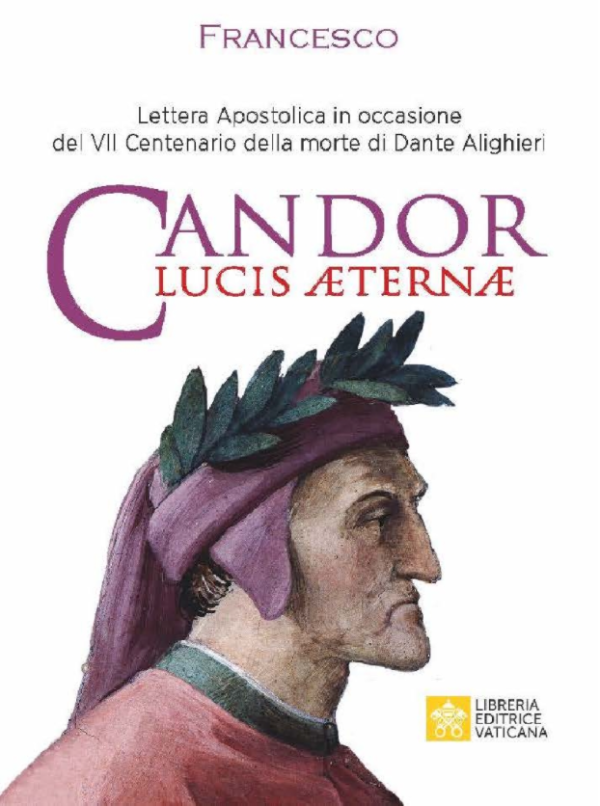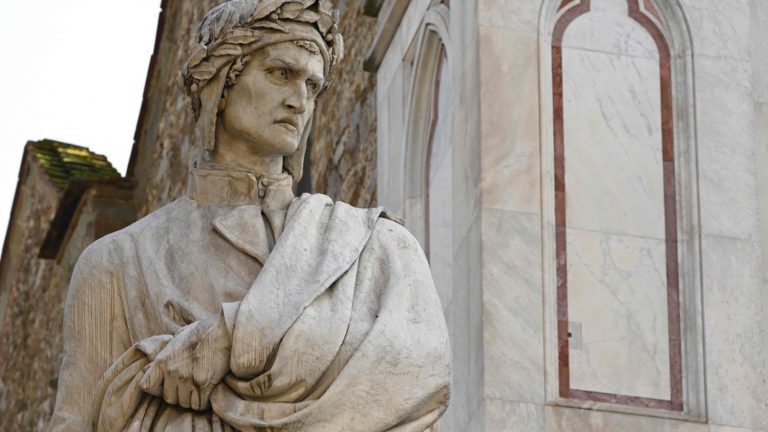This is the second of two posts on the Apostolic Letter commemorating the 700th anniversary of Dante’s passing. You can find Post #1 here.
Refresher:
After an introduction, the letter divides into nine sections:
1) The Popes of the last
century and Dante Alighieri
2) The life of Dante
Alighieri: a paradigm of the human condition
3) The poet's mission as
a prophet of hope
4) Dante as the poet of
human desire
5) The poet of God's
mercy and human freedom
6) The image of man in
the vision of God
7) The three women of the
Comedy: Mary, Beatrice, and Lucy
8) Francis, the spouse of
Lady Poverty
9) Accepting the testimony of Dante Alighieri
Under
the fourth part, “Dante as the poet of human desire,” Pope Francis quotes Dante
from one of his other works, the Convivio.
“The ultimate desire of every being, and the first bestowed by nature, is the desire to return to its first cause. And since God is the first cause of our souls… the soul desires first and foremost to return to him. Like a pilgrim who travels an unknown road and believes every house he sees is the hostel, and upon finding that it is not, transfers this belief to the next house he sees, and the next, and the next, until at last he arrives at the hostel, so it is with our souls. As soon as it sets out on the new and untravelled road of this life, the soul incessantly seeks its supreme good; consequently, whenever it sees something apparently good, it considers that the supreme good” (IV, XII, 14-15).
Pope Francis expands on this: “Starting from his own personal situation, Dante becomes the interpreter of the universal human desire to follow the journey of life to its ultimate destination, when the fullness of truth and the answers to life’s meaning will be revealed and, in the words of Saint Augustine, our hearts find their rest and peace in God.” Yes, this is at the heart of the Commedia, at the heart of Dante’s personal life, and, indeed, at the heart of all our lives as Christians as we make our way to our eternal home.
###
Under “poet of God’s mercy and human freedom,” the Holy Father cites two examples from the Commedia. First is the good Roman Emperor Trajan, who as a pagan had no knowledge of Christ, and yet is the only pagan in heaven. It is a reminder that with God, all things are possible. The second is the King Manfred, who was a horrible human being certainly bound for hell, but in battle after receiving a deadly blow to his skull dies with contrition and the Blessed Mother on his lips. We find King Manfred in Purgatorio. God’s mercy can be obtained at the last seconds of breath.
The
immense number of characters within the Divine
Comedy, each with their lives and decisions laid before the reader, does in
itself compile an insight into the human heart.
Pope Francis sees this as portraying humanity in its dignity and
showcasing their human freedom.
Dante champions the
dignity and freedom of each human being as the basis for decisions in life and
for faith itself. Our eternal destiny – so Dante suggests by recounting the
stories of so many individuals great and small – depends on our free decisions.
Even our ordinary and apparently insignificant actions have a meaning that
transcends time: they possess an eternal dimension. The greatest of God’s gifts
is the freedom that enables us to reach our ultimate goal, as Beatrice tells
us:
“The greatest gift that
in his largess God
Creating made, and unto
his own goodness
Nearest conformed, and
that which he doth prize
Most highly, is the freedom of the will” (Par. V, 19-22).
I should add here that in the English translation of the Apostolic Letter, the quotes from the Divine Comedy are taken from the Longfellow translation. It is not one of my favorite translations, even though it was the translation of the first time I read it. It is definitely outdated in language, and frankly I find stilted. They probably used it for copy write issues.
###
Pope
Francis points out in the section of the three ladies how central the Blessed
Mother is to La Commedia.
In celebrating the mystery of the incarnation, the source of salvation and joy for all humanity, Dante cannot but sing the praises of Mary, the Virgin Mother who, by her fiat, her full and total acceptance of God’s plan, enabled the Word to become flesh. In Dante’s work, we find a splendid treatise of Mariology. With sublime lyricism, particularly in the prayer of Saint Bernard, the poet synthesizes theology’s reflection on the figure of Mary and her participation in the mystery of God.
The Holy Father goes on to note several of the passages where the Blessed Virgin is directly or indirectly essential either narratively or thematically to the work. It’s a fairly standard reading of Dante’s work, so I won’t quote any more. I will agree that the prayer by St. Bernard in the final canto is sublime, among the best poetic lines ever written.
###
Under
“Francis, the spouse of Lady Poverty,” Pope Francis makes a rather audacious
claim.
Saint Francis and Dante had much in common. Francis, with his followers, left the cloister and went out among the people, in small towns and the streets of the cities, preaching to them and visiting their homes. Dante made the choice, unusual for that age, to compose his great poem on the afterlife in the vernacular, and to populate his tale with characters both famous and obscure, yet equal in dignity to the rulers of this world. Another feature common to the two was their sensitivity to the beauty and worth of creation as the reflection and imprint of its Creator. We can hardly fail to hear in Dante’s paraphrase of the Our Father an echo of Saint Francis’s Canticle of the Sun.
At first I was hesitant to accept the claim, but in time I think he may be right. While it seems a stretch to say Dante was in love with Lady Poverty—he wasn’t a poor man and though he had his wealth taken from him he didn’t give it up voluntarily from what I know—he did compose the Divine Comedy in the vernacular as St. Francis composed his Canticle of the Sun. Now you could say this is just one allusion among many allusions to many other writers in the great poem, but it seems to resonate. I was surprised to learn in my last reading of the Divine Comedy that Dante was a Franciscan Penitent, which was what they called a lay order branch of the Franciscans back then. And I think the spirit of the poem does exude a Franciscan spirituality, a sort of embracing of creation and making the Gospel come alive. Of course there is the learned and systemic approach of the Dominicans throughout the poem as well, and one recalls Cantos XI and XII in Paradiso where Dante has a Dominican praise St. Francis and Franciscan praise St. Dominic. Dante is certainly a bit of both spiritualties, but I now accept he may have been more Franciscan.
###
Finally
Pope Francis concludes the Letter by first acknowledging the incredible scope
of the Divine Comedy.
At the conclusion of this brief glance at Dante Alighieri’s work, an almost inexhaustible mine of knowledge, experience and thought in every field of human research, we are invited to reflect on its significance. The wealth of characters, stories, symbols and evocative images that the poet sets before us certainly awakens our admiration, wonder and gratitude. In Dante we can almost glimpse a forerunner of our multimedia culture, in which word and image, symbol and sound, poetry and dance converge to convey a single message.
A
great epic has to encompass a great scope of knowledge and vision, and of all
the great epics, The Iliad, The Odyssey,
The Aeneid, War and Peace, Moby Dick, none I think has as great a scope as
the Divine Comedy. The Holy Father also touches on the Commedia’s ability to transform lives.
If Dante tells his tale admirably, using the language of the people yet elevating it to a universal language, it is because he has an important message to convey, one meant to touch our hearts and minds, to transform and change us even now, in this present life.
Yes, I can attest to that. The Divine Comedy was one of the means by which my conversion back to the faith occurred. Christ came to me when I was ready, but Dante’s work was in my heart for Christ and the Church to find form.
Pope
Francis ends with an exhortation to use this 700th year of Dante’s
passing to disseminate Dante’s work.
It is fitting, then, that the present anniversary serve as an incentive to make Dante’s work better known and appreciated, accessible and attractive, not only to students and scholars but to all those who seek answers to their deepest questions and wish to live their lives to the full, purposefully undertaking their own journey of life and faith, with gratitude for the gift and responsibility of freedom.
Do yourself a favor, if you haven’t read the Divine Comedy, take this year to read it. If you’ve read it and don’t have the time to re-read it, take a canto from any of the three canticas, or better yet, take a canto from each of the three canticas, and read that. Try it in both the Italian and the English. Learn the nuances of that one canto, and tell people about it. Spread the word. The Divine Comedy is the greatest literary work ever composed. It is the height of human achievement.
###
In commemoration of the 700th anniversary of Dante’s death, Pope Francis published this Apostolic Letter highlighting some of the recent history of papal documents on Dante, probing the life of Dante, and journeying through Dante’s great work the Divine Comedy. This was a pleasant read, and while it certainly not ground breaking in any literary way—who would expect that from the Pope?—it really is educational for those with only a passing knowledge of Dante and his work. If you’re a lover of the Divine Comedy, you will enjoy reading the Holy father’s Letter. If you’re new to the work, let this be an inspiration to delve into it.
Indeed,
Pope Francis ends with an exhortation to use this 700th year of Dante’s passing
to make Dante’s work better known. Do
yourself a favor, if you haven’t read the Divine Comedy, take this year to read
it. If you’ve read it and don’t have the
time to re-read it, take a canto from any of the three canticas, or better yet,
take a canto from each of the three canticas, and read that. Try it in both the Italian and the
English. Learn the nuances of that one
canto, and tell people about it. Spread
the word. The Divine Comedy is the
greatest literary work ever composed. It
is the height of human achievement.



No comments:
Post a Comment